Institutional Context
Summary
Ranked third in the UK for graduate employment, Canterbury Christ Church University is a multi-discipline multi-campus ambitious institution with industry hubs embedded throughout the South-East, engaging meaningfully with c.3,000+ organisations since 2019/20, delivering research and innovation to support regional economic growth and social prosperity. For six decades, we have been a major contributor to regional and national public services with 68% of all graduates going onto employment in key worker sectors in the last 5 years. Evolving in response to skills shortages and regional needs, we have grown via capital and public investment delivering impact and widening participation through major strategic initiatives including Kent and Medway Medical School; Engineering, Design, Growth & Enterprise Hub; Hi3 Network and our Community Partnerships.
Institutional context
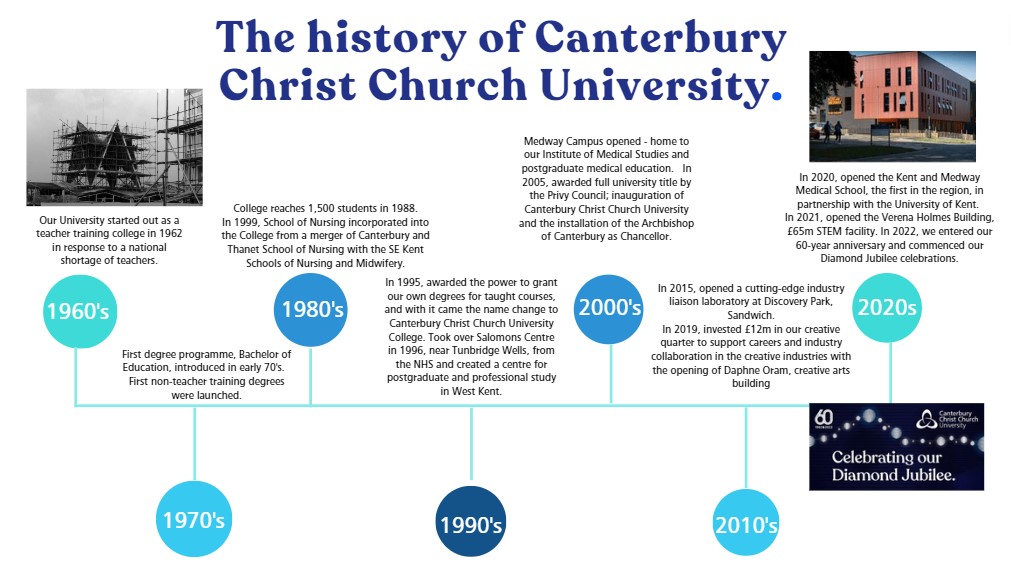
Figure 1: Transformation of Canterbury Christ Church University (CCCU) over the last six decades
Celebrating our Diamond Jubilee in 2022, Canterbury Christ Church University (CCCU) started out as a teacher training college in 1962 as a response to national skills shortages and now has grown and transformed into an international institution serving over 20,000 students, expanding and innovating to support education, health, public services, industry and communities in their place of need (Figure 1). Building on this legacy of support for public services, we continue to champion inclusivity and drive positive societal change through our outreach activities, collaborative partnerships and commitment to frontline services amplified via our train and retain policy leading to almost all schools, hospitals and clinical commissioning groups in Kent and Medway being supported by regular engagement from CCCU staff or students (Figure 2).
Our REF 2021 results highlight the public value of our research and the impact it has in the community as well as the breadth and variety of research and our national and international influence. We have more than doubled our proportion of world-leading (4*) research and quadrupled our proportion of world-leading (4*) impact since 2014.
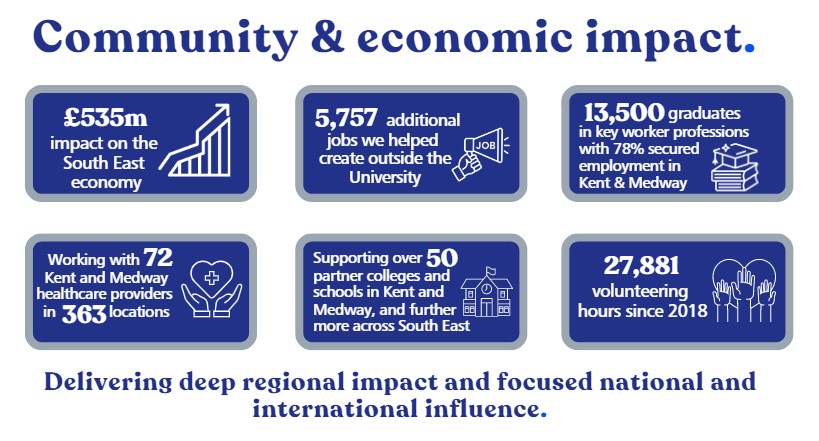
Figure 2: CCCU Community & economic impact
Today, CCCU comprises three faculties delivering more than 600 courses: Arts, Humanities & Education; Medicine, Health & Social Care; and Science, Engineering & Social Sciences, which includes our flagship £65m Verena Holmes building, opened in 2021 and built to stimulate new skills and innovation for Industry 4.0 and 5.0 in the South-East through our Engineering, Design, Growth & Enterprise Hub. Home also to Kent and Medway’s only medical school (partnership with University of Kent) and part of our continued investment of £150m to support local growth and regeneration; address skills shortages whilst narrowing gender and social participation gaps and provide industry with access to specialist facilities to drive innovation and creative exchange of ideas.
Our strategy continues to be informed by local and regional skills and innovation needs, aiming to maximise the potential of our collaborations to drive societal and economic value. This includes i) building meaningful strategic partnerships such as Discovery Park and Ebbsfleet, which extends beyond skills development through the creation of place-based initiatives to support the emergence of innovation clusters; ii) maximising our reach in a region dominated by SMEs through a programme of support via networks and associations including the Federation of Small Business and training and development via Help to Grow Management scheme; iii) the delivery of strategic initiatives through our key industry sectors such as Hi3 Network, providing support for SMEs to adopt new immersive technologies and develop new products in the creative industries.
In 2022, we launched the Academy for Sustainable Futures as part of our ongoing commitment to drive forward a greener more sustainable future. In 2023, we will launch our new strategic framework, Vision 2030 with shaping sustainable futures at the heart of its approach, which will see the University make a step-change in its drive towards educating, researching, advocating, and influencing our collective sustainable futures and making a real and lasting difference to our community, climate change, and sustainability.
For further information, please send queries to B2B@canterbury.ac.uk
Local Growth and Regeneration
Summary of approach
Canterbury Christ Church University is essential to the fabric and vitality of our local and regional economy and communities fostering socio-economic well-being and confronting issues such as inequality through agile knowledge exchange, skills development, major funded projects, and capital investment including a £150m campus transformation to enable regional businesses to benefit from science, technology, medicine, healthcare, creative and digital specialist facilities and programmes.
Embedded throughout the South-East region through a network of campuses and industry hubs, we innovate to support education, health, public services, industry, and communities in their place of need. We develop graduate talent for schools, healthcare and SMEs, and deliver research and innovation to support regional economic growth and prosperity, contributing £535m impact to the South-East economy.
Aspect 1: Strategy
Canterbury Christ Church University (CCCU) was founded in 1962, starting as a small teacher training college with just 75 students. In the six decades since, we have grown into a multi-discipline multi-faculty institution serving over 20,000 students, expanding and innovating to serve the needs of public services, industries, and communities in the South-East, and more specifically, Kent and Medway.
Regional embeddedness and engagement
Bolstered by our campus transformation strategy, CCCU is one of the largest employers and economic actors in the region with locations that include our original site in Canterbury, campuses in Medway and Tunbridge Wells, as well as being present throughout the UK and beyond through our partner institutions. Our embeddedness is unique and vital, both to support public services in their place of delivery, but also to drive innovation in a local and regional economy dominated by small and medium enterprises (SMEs), for whom access to services and support at a place and time that supports their need is a determining factor in their ability to engage. Illustrated below (figure1), we have industry hubs throughout the region, including our Industry Liaison Laboratory at Discovery Park in Sandwich, our Institute of Medical Sciences in Medway, Kent Medical Campus in the North Kent Enterprise Zone, Ebbsfleet Garden City, Hi3 Network across the South-East – facilitating industry collaboration across our key industry sectors – healthcare and medicine, creative and digital, business, the economy and policy and science and technology.
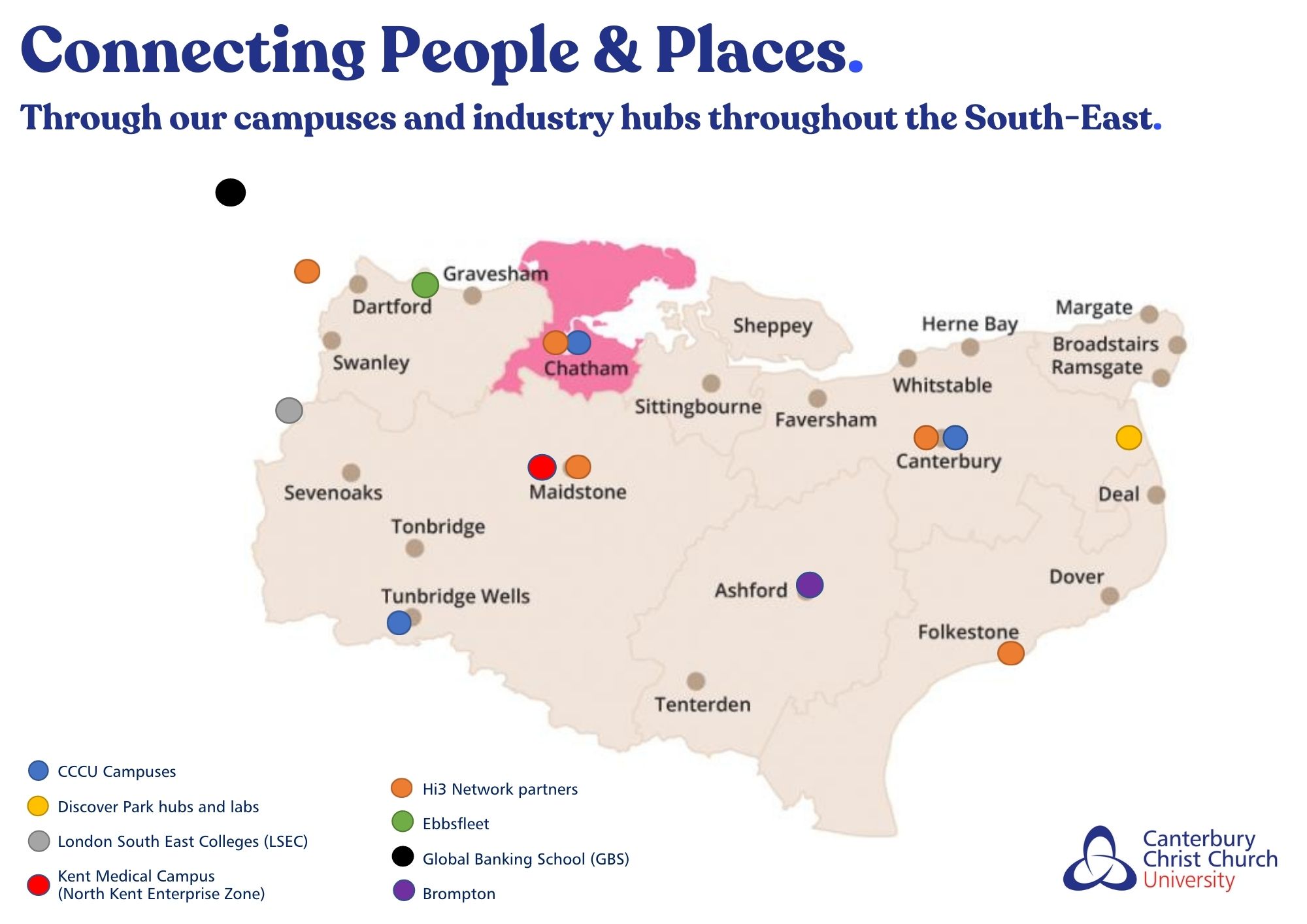
Figure 1: Connecting People & Places
As an outward-facing university, CCCU has a strong track-record of delivering deep regional impact and place-based transformation through meaningful and active engagement across a diverse range of partnerships and sectors ‘to take, translate and apply our knowledge, resources and insights to people and places’. Advocating a ‘no wrong route in’, we take a 360° approach to relationship management for needs identification and building depth and breadth of partnership to support intellectual, economic, social, and cultural prosperity. Key enablers include:
Shaping and influencing regional and local strategies, policies, and practices via representation on key committees and boards, such as Visit Kent, Kent and Medway Economic Partnership, Canterbury 4Business; Discovery Park Skills Steering Group
Gathering feedback to inform continuous improvement through forums, University-led Industry Advisory Boards, and our Market Exchange, where community organisations and SMEs access training, exchange ideas, share information about what they value, and co-create events and activities. This includes Kent & Medway’s first Hydrogen Summit, hosted by regional partner universities, offering business and industry leaders the opportunity to come together to accelerate and innovate the hydrogen economy in the South-East
Active membership of networks such as Locate in Kent, Federation of Small Business, Kent Invicta Chamber of Commerce and formal partnerships with Higher Education Providers operating in the LEP area such as U9 and Kent Innovation Alliance to promote economic growth and knowledge exchange
Responding to regional needs through data capture and building insight via CRM investment with a database of 4000+ organisations to support sector development and targeted business support.
Strategic approach
Drawing on our context and derived from commitments in our Strategic Framework and Strategic Plan for Research & Enterprise and shaped by stakeholder insight, our strategy aims to deliver deep regional impact and focused national and international influence; bringing people, business, research expertise and innovation together to foster creativity and support economic growth.
This strategy continues to be informed by local and regional skills and innovation needs, seeking to widen participation, diversity and sustainability in the workforce, and support regeneration. Research undertaken in 2014 identified skills and innovation shortages in relation to science, engineering, technology and medicine which underpinned the development of our flagship Engineering, Design, Growth and Enterprise (EDGE) Hub, ranging across science, technology, engineering, creative and digital, and supported by £13m+ of public and industry funding, as well as private donations. Similarly, our development of the Kent and Medway Medical School (jointly with University of Kent) has secured £31m in external funding and donations, and now provides the largest area of the country previously without a medical school with the means to train and retain a vital clinical workforce.
Based on the opportunities and needs identified for our local areas, our priorities for local growth and regeneration are:
(i) Diffuse Innovation: Maximise the use of facilities and our infrastructure to empower SME’s and our key external stakeholders to access the right support and resources to stimulate new skills, attract inward investment and promote the diffusion and exchange of ideas and innovation.
(ii) Connect to People & Places: Embed and enhance a network of places with our partners facilitated through our existing industry hubs (e.g. Discovery Park) and services provision, by encouraging the creation of new innovation zones and clusters to support emerging industries (such as Industry 4.0/5.0, digitalisation) and address major challenges (net zero).
Aspect 2: Activity
Our embeddedness in the fabric of education, public services, industry and innovation across Kent and Medway is at the heart of our approach - promoting regeneration and inclusion through major strategic initiatives, capital investment and partnerships. We have provided almost 14,000 graduates to the Kent and Medway economy in the last five years, of whom more than 90% originated from the region. With a local and regional economy dominated by SMEs, and the public sector as the largest employer, this embeddedness is unique and vital, both to support public services in their place of delivery, but also to innovate with SMEs, for whom access to services and support at a place and time that supports their need is a determining factor in their ability to engage.
Diffusing Innovation
Stimulation of new skills: Kent & Medway Medical School (KMMS), is the first medical school in Kent and Medway (partnership with University of Kent), providing a centre in the region for medical education and research to develop the area’s health workforce, and address the growing need for medical professionals in the area due to rapid housing and population growth (figure2). Securing £31m in funding, the school aims to widen participation in medicine as well as ensuring that our local NHS remains reflective and understanding of patients’ needs in the future, welcoming its first cohort of 108 students in September 2020, of which 37% of the founding cohort were recruited from backgrounds traditionally less well represented in the medical field.
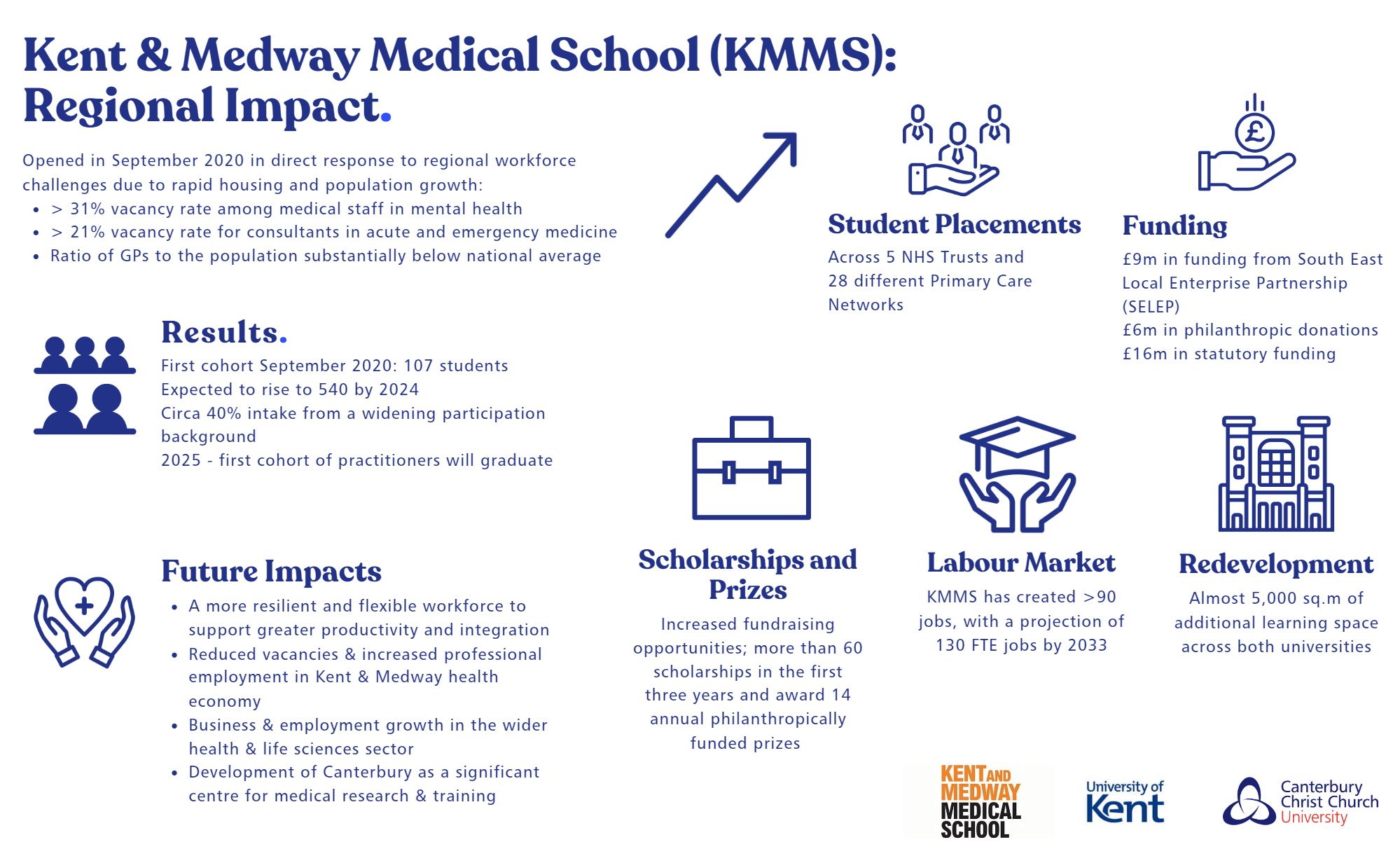
Figure 2: Kent & Medway Medical School (KMMS) Regional Impact
Inward investment: Working with Locate in Kent and EKC Group, CCCU were part of the consortium pitch to attract Brompton to locate their global headquarters and manufacturing facility in Kent to support skills development in the region, including apprenticeships. The plans by the UK’s largest bicycle manufacturer would represent a GVA uplift of around £290 million for the local area once operational, employing over 2,500 staff and the potential to support over 2,400 jobs indirectly.
Campus transformation: investment in both physical and human capital has seen the University embark on an ambitious transformation programme (figure3), including £150m capital investment into bringing the campus into the 21st century with a new STEM facility Verena Holmes and Creative Arts building, Daphne Oram and specialist equipment and hi-tech facilities to support industry collaboration.
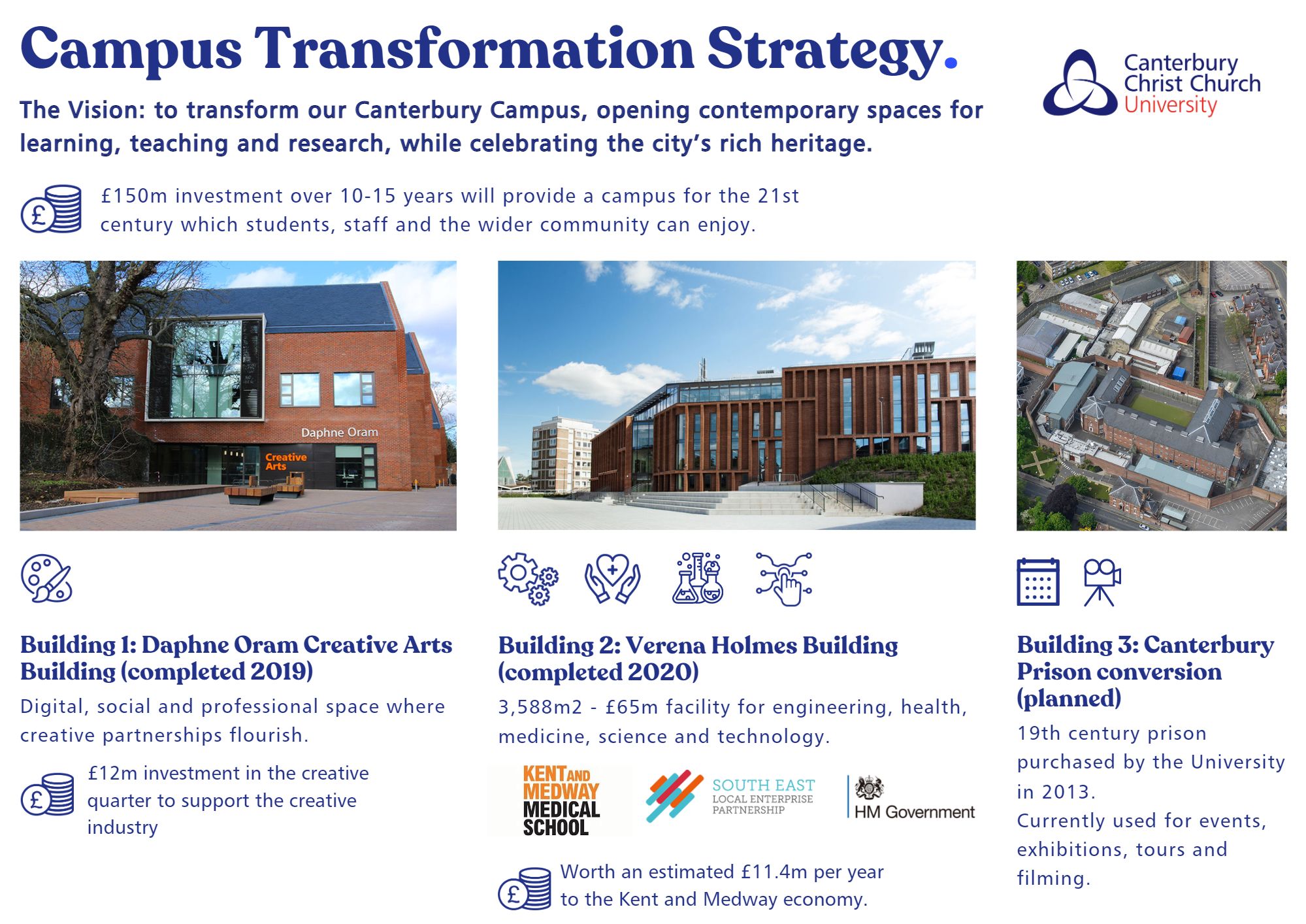
Figure 3: Campus Transformation Strategy
Industry collaboration: Through initiatives such as Catapult Innovation Vouchers and launch of our consultancy policy providing over 25 businesses in its first year with the opportunity to access funding, academic expertise and resources to help them grow and develop. This includes linking our scientific strengths to local industrial opportunities through access to cutting edge research, facilities and equipment to develop science partnerships
Connecting People and Places
Place-based knowledge exchange economy: We continue to expand our partnership with Discovery Park, collaborating to enrich the regional knowledge exchange landscape and park offer to tenants, helping to attract and retain much needed regional talent by bringing together educational and industry partners through a number of initiatives: i) widening access to educational opportunities for our local communities and offering local schoolchildren the chance to discover and develop an interest in the important STEM subjects via the Community Lab; ii) offering a one-stop shop for education and skills for employers via the Skills Hub; iii) providing opportunities for staff and students to collaborate with industry through research into new treatments and ground-breaking discoveries via the Industrial Liaison Lab; and iv) equipping businesses with support through our commercial and advisory services via our Mediation Clinic and Business School-in-Residence
Network of places: Launched in 2020, Hi3 Network is a Research, Development, and Innovation project part-funded by the European Regional Development Fund (ERDF). Valued more than £6m, it is the largest ERDF grant awarded in the South-East LEP region to work with SMEs in the creative industries. Its geography is strategically designed to maximise engagement and commercialisation with the creatives industries across the South-East to capitalise on London’s notable creative drift out to the coastal communities and address digital skills shortages.
Covid response: Working with the Chambers; Growth Hubs, Innovate UK Edge and industry partners, CCCU provided business support to stimulate innovation with a free virtual conference aimed at SMEs GRID (Growing Regional Innovation by Design) and delivered 'bite-sized' leadership courses ‘Business Lab’ with Locate in Kent - helping business leaders plan their future road ahead in a post-lockdown economic landscape. Our health students and staff also supported the NHS workforce; boosting PPE supplies to the health and social care sectors through donations and access to our 3D printers; development of new diagnostic radiography services for the safe and effective diagnosis of Covid-19; and providing online resources, training, support and advice for parents and teachers involved in home schooling.
EDGE Hub: Developed in partnership with industry and supported by c.£13m+ funding from the South-East Local Enterprise Partnership, former Higher Education Funding Council for England, and the Garfield Weston Foundation, the Engineering, Design, Growth and Enterprise (EDGE) Hub is a University-wide strategic initiative, which addresses the current challenges faced by businesses and organisations in the South-East, acting as a catalyst for change and inwards investment, together with the stimulation of new skills and innovation for Industry 4.0 and 5.0. Creating a sustainable and diverse regional talent pool with 30 to 40% of graduates from disadvantaged backgrounds, EDGE Hub will be worth an estimated £11.4m per year to the Kent and Medway economy through its distributed hubs. Headquartered at the flagship Verena Holmes STEM facility, it has distributed centres of excellence across Kent and Medway and holds the STEM Learning schools network contract, STEM Hub, for the South-East; is the nominated WISE Hub for the South-East; part of the international CDIO (Conceive, Design, Implement & Operate) community; and Primary Engineer’s education partner for the South-East.
Aspect 3: Results
Delivering £535m economic impact to the South-East economy, we have engaged meaningfully with c.3,000+ businesses since 2019/20, formally assisting c.550 businesses to achieve their business goals, linking our strengths to local industry opportunities through a range of services, initiatives, and partnerships.
Our impact and influence are essential in shaping economic growth, educating 20,000 graduates in the past five years, with many choosing to stay in Kent and Medway to launch their career – providing the local business community with a sustainable talent pool. c.35% of students are from underrepresented groups reflecting the University’s commitment to inclusivity. Furthermore, we have been a major contributor to regional and national public services, providing graduate skills to enhance the regional and national key worker workforce, supplying 13,500 graduates over the last 5 years with 78% securing employment in Kent and Medway in health, education and other vital frontline occupations.
EDGE Hub: Despite enrolment of the first engineering cohorts taking place shortly before the Covid-19 pandemic began, EDGE Hub (figure4) had supported 2,500 students by the 2022/2023 academic year and delivered its first-degree apprenticeships to local engineering companies. We are one of the few universities in the UK to offer the pioneering CDIO international engineering education model which was developed by the world-renowned Massachusetts Institute of Technology (MIT) and aims to promote collaboration between organisations, industry, and education providers in the context of Conceiving, Designing, Implementing and Operating (CDIO). To date, 173 CDIO student projects have been delivered with many focusing on the reduction of carbon footprint and one such project for AMC Ltd being awarded £3,000 from the Engineers in Business Fellowship for the best solution of a ‘slamlock’ system for Ford vans. Engagement with the Hub’s activities has reached > 1,000 companies including Primary Engineer Sponsorship of £10,000 from the Port of Dover; and more than 60 companies engaging in curriculum development.
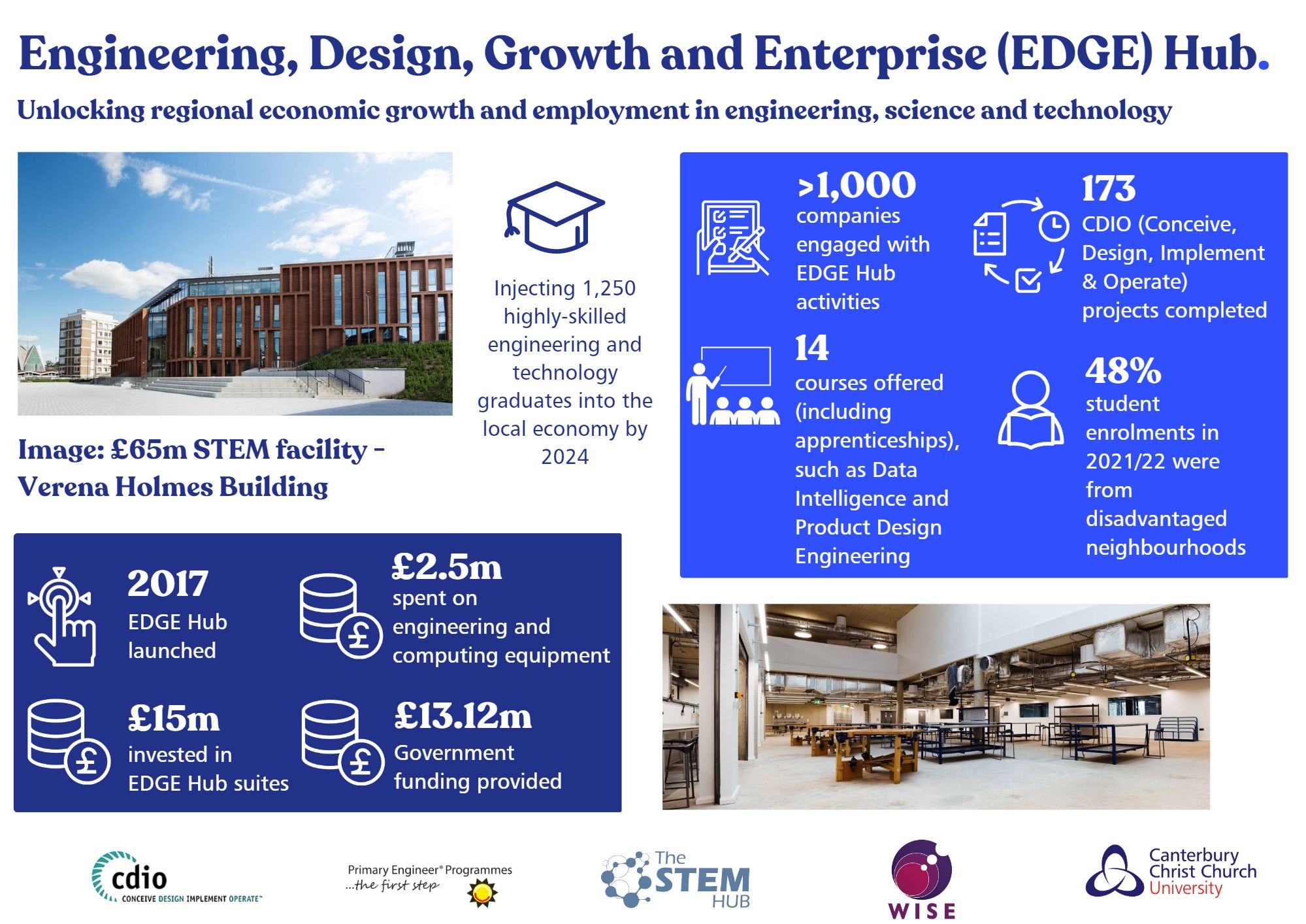
Figure 4: Engineering, Design, Growth and Enterprise (EDGE) Hub
Discovery Park: Supporting Discovery Park’s mission to become a world leading science park by 2027 and drive improvements in healthcare through innovation and collaboration, CCCU has engaged with more than 60% of tenants onsite and worked closely with the park to attract new tenants through skills development and research. To date, CCCU via the Skills Hub has helped more than 30 companies navigate the complex landscape of education and accessing talent. This includes apprenticeships; accessing student talent through projects and recruitment including a CDIO (Conceive, Design, Implement, Operate) project with healthcare company, eXroid, and a variety of networking and informative events, such as ‘Unlocking Funding’ co-delivered with Innovate UK Edge. The Industry Liaison Lab has delivered more than 50 industry-focused projects, generating almost £800k in revenue to include £267k in grants (Genea Biomedx and Topigs Norsvin). 70% of projects provided internships and more than 40% led to employment of students. Since opening, more than 400 undergraduate students have also had a meaningful research- or industry-linked experience as a direct result of the Lab. The work also led to one of the two REF 2021 impact case studies submitted and new partnerships being formed including Comax Life Sciences to investigate new ways to combat the transmission of diseases.

Figure 5: Strategic Partnerships: Discovery Park
Hi3 Network: Since its inception during the pandemic, the network has engaged with 85 businesses through 14 events. More than 150 people have attended in-person and virtual events; businesses have received 560hrs of business support and 17 collaborative projects have commenced with academic partners, providing SMEs access to new, cutting-edge creative tech to experiment and conduct R&D work.
Addressing major challenges such as Net Zero: Hydrogen Summit was attended by 135 people across several sectors. Following this, the three universities have continued to work together to help shape and inform activity in the region, which includes working with Thames Estuary Growth Board to set up a regional living lab; bringing stakeholders together to discuss issues and opportunities; and holding several smaller events. Building on the success from the Summit, the three Universities will be hosting the Energy & Tech Sustainability Expo at Discovery Park in Spring 2023.
Communicating and acting on results:
We take a consultative and inclusive approach to capturing feedback and disseminating information to stakeholders utilising various communication channels including commissioning independent research; regional forums; Annual General Meetings; Community Newsletters; and online engagement through social media including blogs and articles. Through key performance indicator monitoring and tracking, we can act upon results utilising a range of reporting mechanisms including CRM. Insight gathered by programme owners, be they formal, informal quantitative or qualitative inform reflections and drive provisions improvement based on programme or partner objectives and success indicators.
Public & Community Engagement
Summary of approach
Canterbury Christ Church University has a long history of working collaboratively to respond to local, regional, and national needs. Our Anglican Foundation underpins our commitment to serve for the public good and shapes our geographical footprint as we seek to open the doors to the University for some of the region’s most disadvantaged communities.
Our mission to ‘enrich communities, transform individuals, and build sustainable futures’ drives our public and community engagement (PCE) activity and partnership development, enabling knowledge exchange that positively contributes to communities in Kent and beyond.
Built on a legacy of support for public services, our focus is on promoting inclusivity and wellbeing, confronting social issues, and widening participation through outreach, sporting, STEM and cultural activities.
Aspect 1: Strategy
Our Context
Underpinned by our Church of England (CofE) foundation, we believe in the power of education to transform lives: of our students, of our local, regional and national communities and stakeholders, and of the wider public. An anchor institution with campuses and hubs embedded across Kent and Medway, our sense of place is within a region of dispersed coastal, urban and rural communities, but with a national reach and identity in key areas of expertise, e.g.: education, sport, health policy/practice (Aspect3). We share our resources (expertise, facilities, people) to cocreate engagement that is responsive, enriching, and empowering to the communities we serve.
Our Strategy and Objectives
Drawing on our context, and derived from established ambitions in our Strategic Framework and Strategic Plan for Research and Enterprise to ‘support intellectual, social and cultural prosperity’ and ‘address challenges in the sectors and communities we serve’, our strategy is informed by continuous engagement with local and regional stakeholders and communities (Aspect2), and with representative national organisations and charities (e.g.: Youth Sport Trust; CofE Education Office), to establish need. Also informed by the Civic University Network’s seven domains of Civic Commitment (figure1), our KE Concordat Action Plan and HEIF Accountability Statement outline objectives (including important EDI commitments) to develop PCE activity (Aspect3) that will:
PCE01: Influence Policy and Practice locally, regionally, and in key areas nationally, particularly in public and third sectors and public services, but also industry, to benefit and engage communities, particularly those not well served by existing policy and practice.
PCE02: Enhance and Enrich Lives through a diverse range of local, regional and national activities and influences, serving diverse communities, and particularly targeting under-represented and disadvantaged groups.
PCE03: Take an Active Civic Role modelling behaviours to support, advocate for, and participate in projects and partnerships where established, and leading and creating them in areas of new or unmet need.
PCE04: Inspire and be Inclusive ensuring that all that have the potential to benefit from the power of education to transform lives, particularly those under-represented, are inspired and enabled to engage with the widest range of informal and formal opportunities higher education offers.

Figure 1: Seven Domains of Civic Commitment
Our Governance, Accountability and Resourcing
Senior Management leadership of PCE lies with the Senior Pro Vice-Chancellor for Research, Enterprise & Business Development (SPVC), who has annual objectives for PCE delivery in their work plan. The SPVC oversees a Department of Enterprise and Engagement (DE&E) with a specific remit, staff and resources to directly deliver PCE, and support delivery in other parts of the University, both in Academic Faculties, to whom resources (time and funding) for PCE are devolved, and in central services, such the Department of Marketing and Communications. The SPVC reports to the Vice-Chancellor, with scrutiny to ensure quality, EDI and value-for-money through monitoring, reporting and review (Aspect5) through the academic committee structure, including Research and Enterprise Integrity Committee reporting via Academic Board, and Equity and Inclusion Committee, both of which report to the University’s Governing Body.
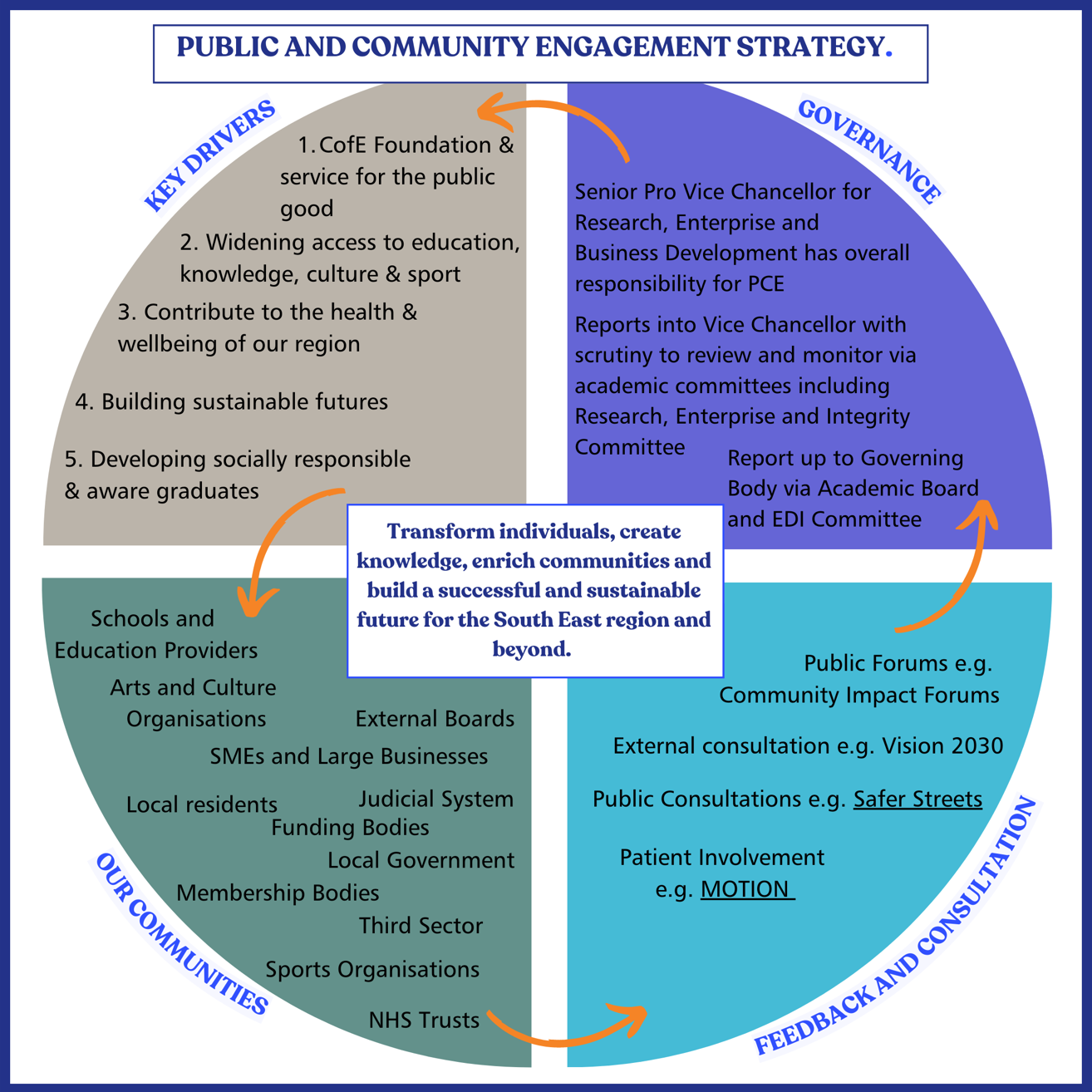
Figure 2: Public and Community Engagement Strategy
Aspect 2: Support
Resourcing, Recognition and Reward
PCE is a fundamental part of our students’ experience, our research practice and our enterprise engagement, and thus is resourced from both core funding (providing PCE time for central support staff and all academic staff) and from QR and HEIF (providing specific central support resources, and PCE time/resources for c.250 academic staff with Significant Responsibility for Independent Research (SRIR) or who are Academic Enterprise Champions (AECs)). Time is allocated in all Academic Workload Profiles (AWLP) to encourage PCE, both in Research & Enterprise (R&E) ‘bundles’, and in Personal and Professional Development (including time for individual consultancy and School Governor roles in partnership with ‘Inspiring Governance’), which are discussed annually and throughout the year in ‘performance conversations.’ For staff with SRIR or AECs, who have additional AWLP allocations, PCE is an expected part of practice, discussed in annual research/enterprise conversations, and detailed in Individual Research Reports and Proposals (IRRPs) or Individual Enterprise Plans (IEPs), supported by expenses. Our Academic Career Framework includes responsibilities and recognition for PCE as part of research or knowledge exchange (KE) at every level up to and including professor and is considered by promotions panels. Both academic promotion processes, and allocation of SRIR and AECs, are monitored and reviewed annually against EDI outcomes.
Primary support for PCE is provided by our DE&E, with dedicated staff for KE, PCE and to manage external relationships, with additional support provided by our Departments of Research Development and Graduate Futures (figure3). Collectively, these departments provide: an integrated PCE training programme, delivered in-house, by commissioned external experts/advisors (including NCCPE), or by funding places on external CPD programmes; annual opportunities to develop PCE activities, including Participatory Research Grants, Enterprise or Engagement Kick-Starter Grants, and R&E Internships; robust ethical guidance through our R&E Integrity Framework.
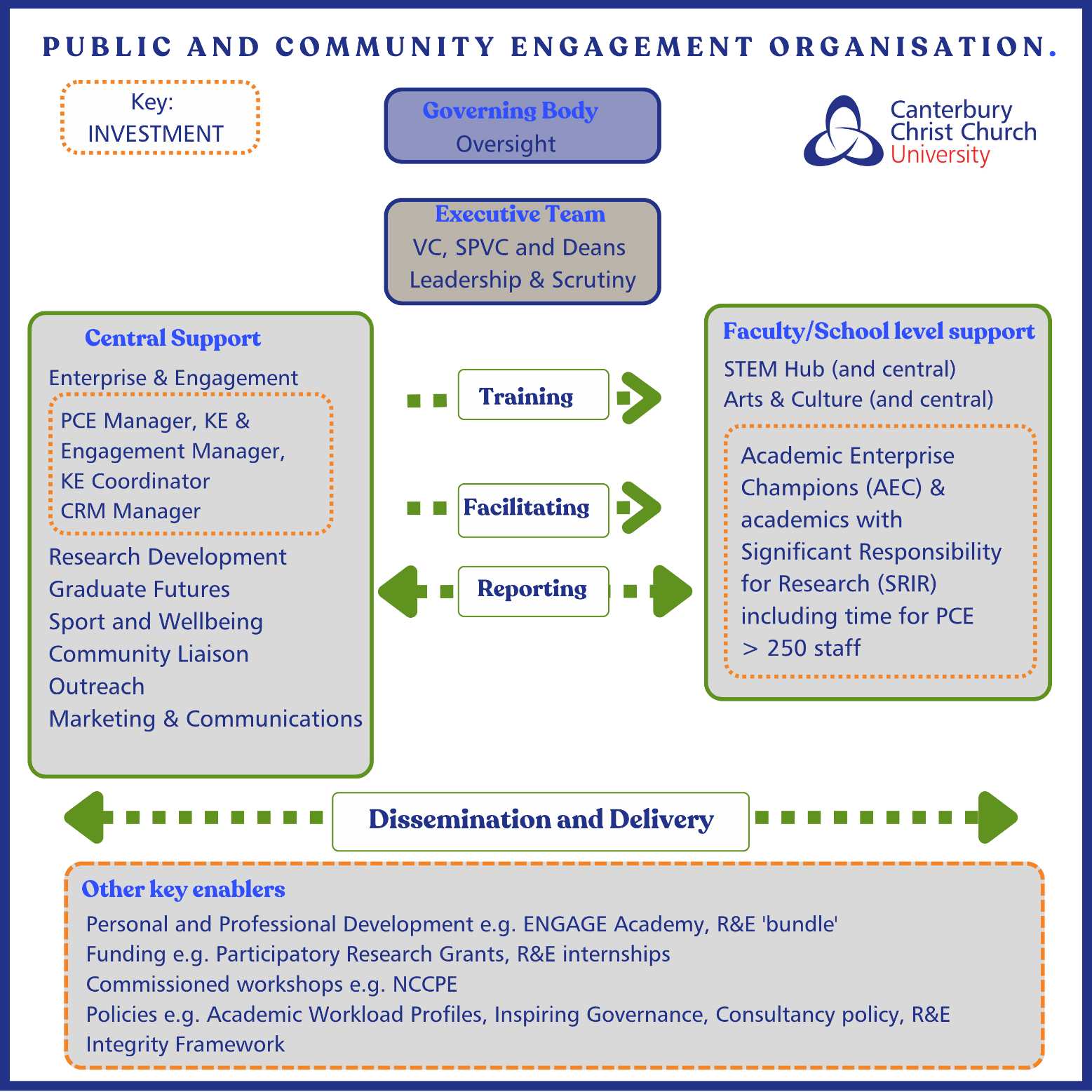
Figure 3: Public and Community Engagement Institutional Organisation
Engagement and Effectiveness
Our customer relationship management (CRM) system has a bespoke enterprise and engagement module to support KE, enterprise and PCE, allowing us to monitor engagement, track preferences, impact and outcomes, and tailor and segment our PCE offer for interested audiences, locally, regionally and nationally, to widen beneficiary reach. Continuous improvement is informed by individual feedback, Community Impact Forums and our Market Exchange, where community organisations and SMEs access training, exchange ideas, share information about what they value, and co-create events and activities, which in turn allows us to reflect on what works and anticipate future needs. Our dedicated website further supports these interactions and promotes our offer. Our CRM monitoring (Aspect4) evidences effectiveness, awareness, and that our offer is valued, showing we have worked with 3,000+ local and regional organisations, and welcomed 10,000+ visitors to campus events (figure4)
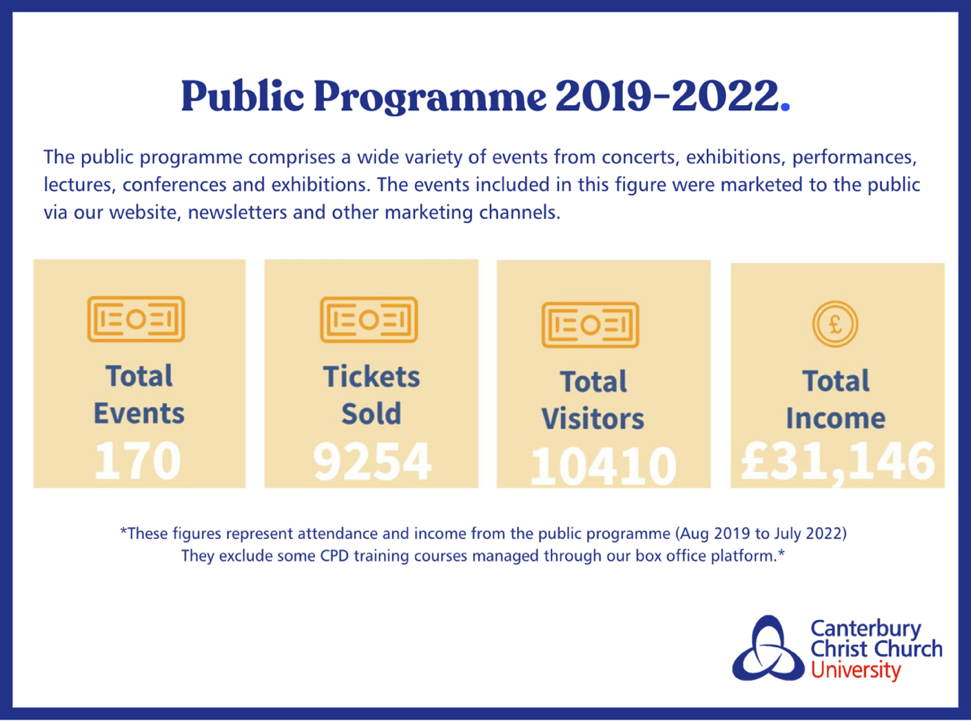
Figure 4: Arts and Culture Public Programme 2019-2022
Aspect 3: Activity
Illustrative examples of our significant portfolio of activities in pursuit of our strategic goals (Aspect1), the diverse national, regional and local communities they serve, and their purposes and outcomes, are set out below:
PCE01. INFLUENCE POLICY AND PRACTICE.
Education policy: Our National Institute for Christian Education Research (NICER), working with CofE and senior Christian Education leaders, has developed new curricula and inspection frameworks, implemented in all 4,700 CofE schools in England, improving lives and character education for 2,000,000+ pupils, the practice of 30,000+ teachers, and influencing practice internationally.
Environmental policy: Working with regional stakeholders (e.g.: Kent Wildlife and Wildwood Trusts), our Academy for Sustainable Futures, has delivered biodiversity research to underpin advocacy and policy for (re)wilding Kent, supported by public debates co-hosted with the Trusts to inform regional media discussion.
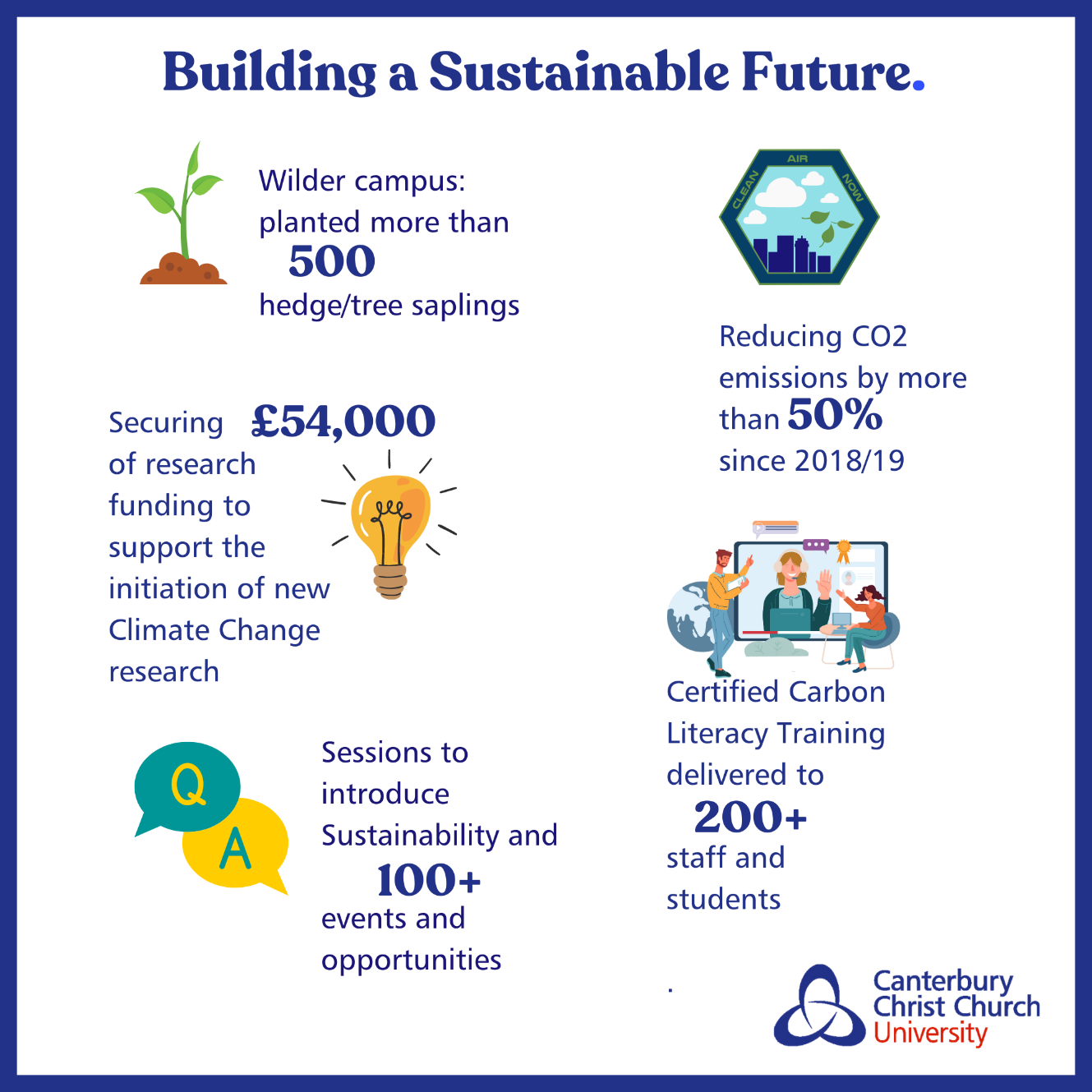
Figure 5: Contributing to a Sustainable Future
Social Policy: Bringing together local partners – Kent Police, Canterbury City Council, University of Kent – we led a local consultation to underpin a £589,042 grant from Home Office’s Safer Streets Fund for action research on Canterbury’s night-time economy, delivering increased lighting, signage and mirrors to improve safety for local resident and student communities, and establishing a CCCU-led multi-agency complaints triage process to improve speed of action, response and enhancements to practice.
PCE02. ENHANCE AND ENRICH LIVES
National and Regional Sporting Life: Our Centre for Sport, Physical Education and Activity Research (spear) supports widening participation in sport, through national evaluations – e.g.: Chance to Shine, a free programme in 4,000+ schools and 200+ disadvantaged communities across Britain; Project Rugby, which helps underrepresented groups access sport. Our decade-long Kent Women’s Cricket sponsorship, the longest-standing in the national game, underpins outreach programmes providing inspiration and opportunities for women and girls across Kent and beyond.
Life-long Health and Wellbeing: Our Sidney DeHaan Research Centre for Arts and Health supports singing for health and wellbeing across the life-course, benefitting 30,000+ people in the UK, plus more in Europe, Australia, North America and Malaysia. Regionally, our Silver Song Clubs networks are self-sustaining because of the benefits participants enjoy, with the ‘Folkestone Singing for Health’ self-funded choir (80 members), which reduces illness-based stigma, promotes inclusivity, and provides evidence-based activities to local social prescribers, recently being supported by BA Music and Commercial Music students.
Canterbury Life: Through sponsorships, event hosting, opening our campus and volunteering, we enhance Canterbury life for local residents and visitors, including sponsoring Canterbury Festival (12years), Canterbury Pride (7years), Canterbury Medieval Pageant, (10,000+ visitors), and partnering with CanterburyBID in the Award-winning Canterbury-in-Bloom (figure6).
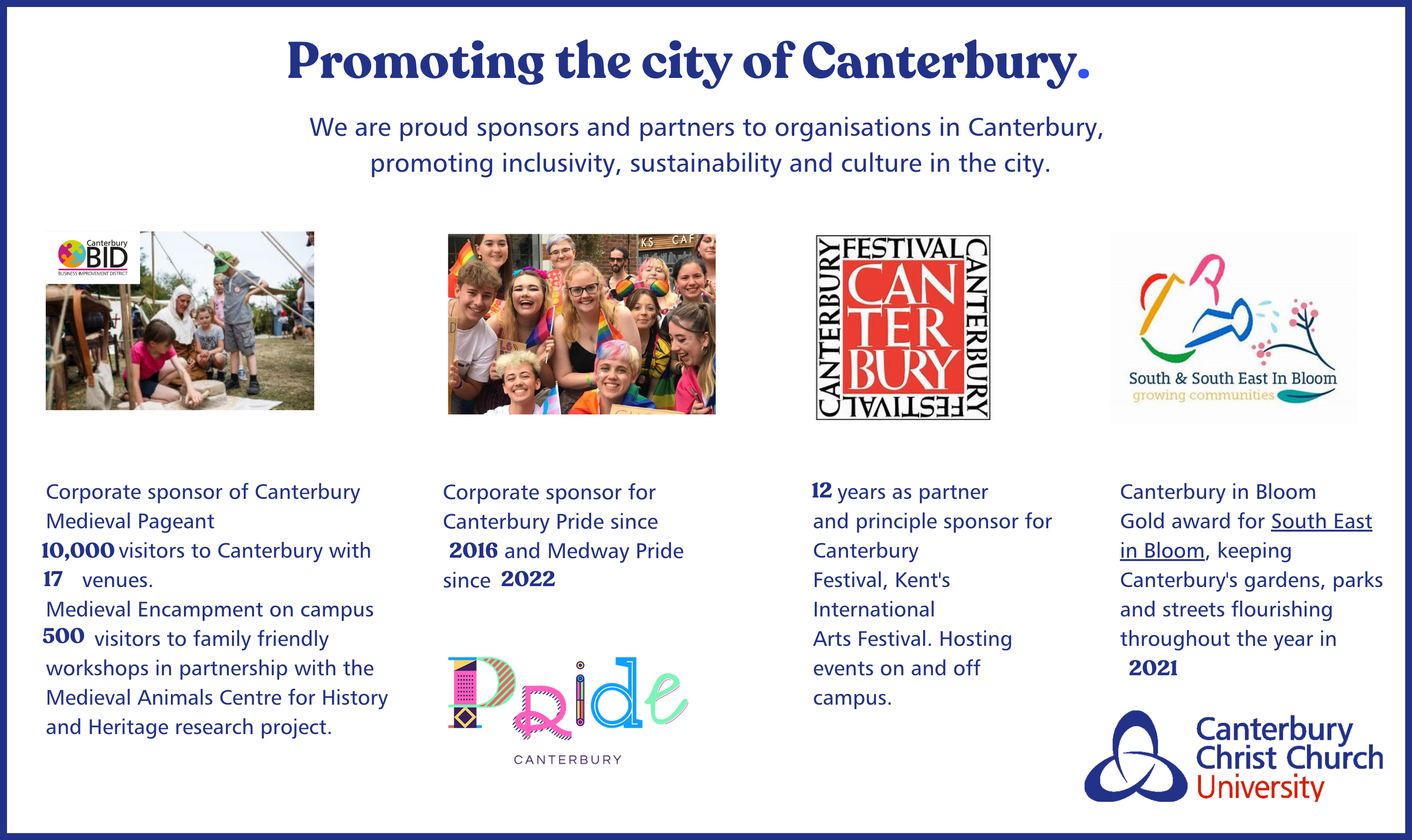
Figure 6: Promoting the City of Canterbury
PCE03. TAKE AN ACTIVE CIVIC ROLE
Supporting Refugees: With Canterbury for Ukraine Consortium, we have provided 1,000 hours of free language support for displaced Ukrainian adults, which has expanded into two Kent County Council funded projects, supporting Ukrainian professionals and vulnerable Ukrainian adults (e.g.: single mothers), which increase integration into our local and regional community through employment, cultural engagement, and improving emotional wellbeing
Supporting Black Lives Matter: A committed anti-racist institution, we established ‘Black History 365’ to celebrate Black History Month year-round, showcasing invaluable contributions the Black community makes to our learning community and society. Our programme of lectures, art exhibitions and concerts engages local and regional communities, and supports the University’s ‘Closing Our Gap’ initiative to reduce educational attainment gaps experienced by Black communities.
Supporting Justice: Collaborating locally, our Mediation Clinic provides early dispute resolution, helping those that can least afford it to avoid costly legal expenses. Our student volunteer Legal Companion Scheme, provides important assistance to people who attend court unrepresented (538 cases since 2016). Internationally, action research with Oliver, our award-winning service dog, has demonstrated canine companionship to victims and witnesses of crime reduces anxiety and stress in court and police interviews, improving evidence quality, leading to safer convictions. As a result, provision for service dogs features in UK and Canadian justice systems, and in every US state, including training to support vulnerable victims.
PCE04. INSPIRE AND BE INCLUSIVE
Inspiring Science Engagement: Reaching into all schools and colleges across the South East, our STEM Hub provides free advice and guidance on STEM enrichment activities and career paths, engaging 2,350,000+ children and providing 121,706 STEM Ambassador volunteering hours. Locally, partnering with Pfizer, educational charity STEM Learning, and Discovery Park (Europe’s largest science park), our Community Lab grows the regional STEM skills base by providing schools with inspirational access to industry standard laboratories, facilities and equipment, training teachers and engaging 3,500+ young people.

Figure 7: The STEM Hub 2019-2022
Inspiring STEM careers: Our award-winning Inspiring Minds Project, (£226,100, 2018-22) addresses key representation gaps in STEM careers, engaging 400+ under-represented pupils (92% POLAR3 Quintile1). Led by our LASAR Centre, the project features in the government’s Transforming Access and Student Outcomes report on outreach interventions that raise aspirations and confidence.
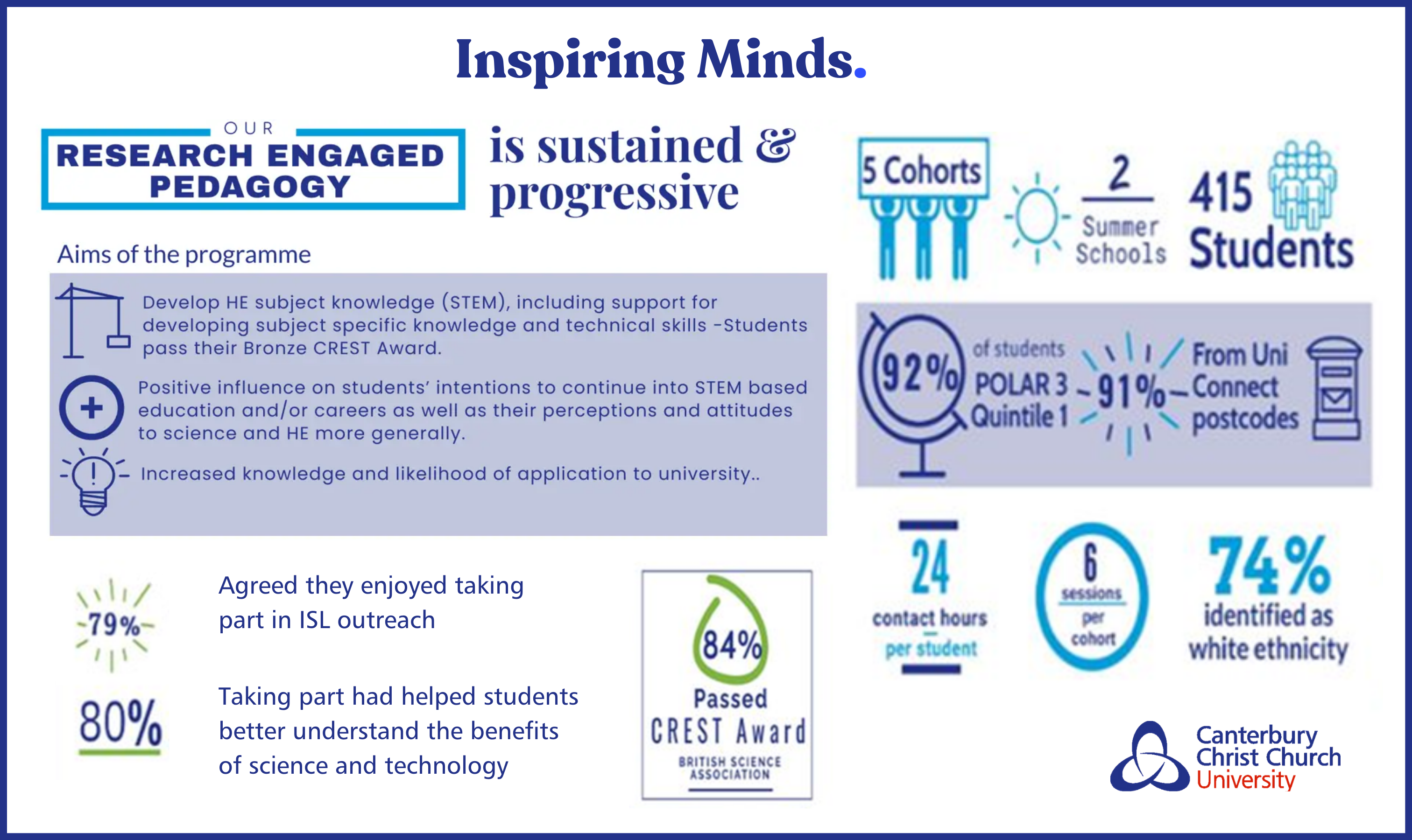
Figure 8: Inspiring Minds Project
Inspiring Humanities: Funded by successive British Academy and AHRC grants, we have delivered Canterbury’s contribution to the national Being Human Festival since 2016. This has included celebrating Canterbury and East Kent’s cultural history with local residents in partnership with Dreamland in Margate, a play written to commemorate the Suffragette Movement and women’s roles in the First World War, and an immersive Gothic Games Night for local residents and visitors.
Aspect 4: Enhancing practice
Principles for Monitoring and Evaluation
We have institution-wide principles to assess quality, value-for-money, outcomes, and EDI impacts of PCE (Aspect3), which we expect to be:
Economical (whilst not compromising on quality of resources or outcomes)
Efficient (in time and resource use)
Effective (in addressing strategic objectives and delivering project goals)
Equitable (and accessible for all intended audiences)
While processes and methodologies may vary, our expectation is that PCE is always evaluated against these principles.
Processes for Monitoring and Evaluation
PCE monitoring and evaluation (M&E) takes place at portfolio and project level (figure9), with the former including review and analysis of data: (i) on income and activity in HEBCI returns; (ii) on sizes, characteristics and preferences of audiences, drawn from our CRM (Aspect2); (iii) on graduate activity and destinations, drawn from Graduate Outcomes. Project level M&E is designed and delivered locally, with support and advice from DE&E, with expectations to: (a) draw on our M&E principles; (b) include institutionally collected data where relevant (e.g.: on volunteering, ticketing, media coverage, bidding activity); (c) incorporate bespoke qualitative or quantitative data collection. These common principles and expectations allow aggregation of project level M&E to provide a cumulative picture of PCE portfolio performance (this integrated framework is illustrated in figure10 and includes data that comprises our PCE KPIs). Additionally, staff can share their experiences of delivering PCE at portfolio and project level through online-form data-capture (via our CRM), which allows us to drill down into outputs, to support colleagues with external relationship management, and collate EDI data to monitor access and reach to our diverse communities.
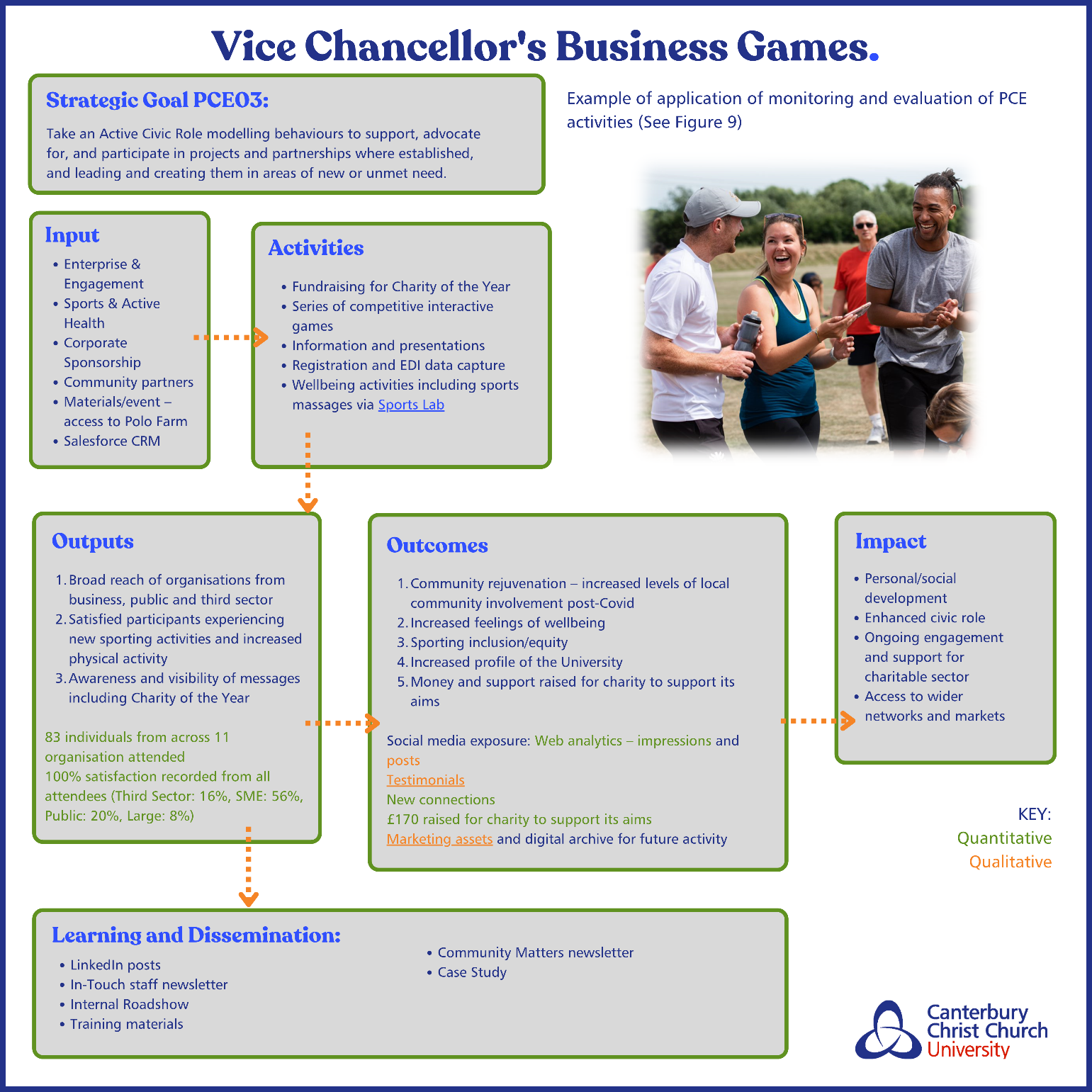
Figure 9: An Illustrative Example of our Approach to Monitoring & Evaluation: The Vice-Chancellor's Business Games

Figure 10: Integrated Framework to Monitor and Evaluate Public and Community Engagement
Acting on Monitoring and Evaluation
Outcomes and insights from PCE M&E are shared at all levels within the organisation, and widely with external communities. Internally, dissemination utilises formal and informal mechanisms: the University’s governance structures, with insights, feedback and learnings flowing bi-directionally between central and faculty committees; and via staff newsletters and periodic updates to faculty and school R&E leads. Our University Annual Report and our Annual PCE Report are distributed for internal and external audiences, whilst our corporate and subject level social media accounts and our Expert Comment blog are explicitly developed for community engagement. Our Community Matters newsletter, containing news, events, key dates and community support details, directly mailed to 76,000 Canterbury households, includes contact details for enquiries and feedback
Aspect 5: Building on success
Evolving and Enhancing Strategic Support
We extended the requirement of the Concordat to Support Research Integrity to include enterprise and engagement, and thus produce a formal Annual Statement on Research and Enterprise Integrity, which scrutinises the effectiveness of our strategic support to ensure R&E (including PCE) is conducted to the highest standards of integrity and quality. The Annual Statement is developed, discussed and scrutinised at all levels of our governance structures, and approved by the Governing Body. It includes consideration of R&E Quality Improvement and Enhancement (REQIE), our internal process through which academic faculties produce Faculty R&E Portfolio Plans (FREPPs), which review their progress and impact, and guide activity. FREPPs provide the context for IRRPs and IEPs (Aspect2), thus connecting institutional PCE strategy to individual activity. REQIE also includes competitor benchmarking, including KEF Cluster J and those immediately above and below us in REF rankings. Since 2019, this approach has evolved and enhanced our strategic support as follows:
Refining three broad goals for PCE (see KEF1) to four specific strategic objectives (Aspects1&3)
Establishment of new bespoke Departments of Enterprise & Engagement, Research Development, and Graduate Futures (Aspect2)
Devolution of resources to academic faculties for a network of Academic Enterprise Champions (Aspect2)
Development of an integrated reporting framework for M&E of PCE portfolio and project performance, and establishment of PCE KPIs (Aspect4)
Creation of an Annual PCE Report for internal and external audiences (Aspect4)
Commencement of work on a Civic University Agreement, uniquely focused on partnerships with a wide variety of stakeholders across the diverse Kent and Medway region (Aspect1)
Clearer focus on EDI in outcomes (Aspect3), strategy (Aspect1) and M&E (Aspect4)
Involving Communities and Stakeholders
These enhancements, and annual and ongoing scrutiny of our strategic support, are also informed by our communities through M&E at portfolio and project level (Aspect4), which includes public fora and committees, town hall sessions with individual and organisational stakeholders, general meetings, and our Community Impact Forum. Additionally, in 2022, we commissioned independent research comprising in-depth interviews with a wide-range of stakeholders to help us understand perceptions of our external engagement and relationships, and inform areas for improvement.
Note You are currently viewing the latest version of this narrative statement. View the previous version as published in previous iterations of the KEF (KEF1 and KEF2)